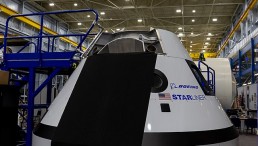Brian Wu
Pushed to the Brink—Humans Put Earth in 'The Danger Zone'
New Horizons Prepares for Pluto Flyby
Beagle 2 Discovered Intact on Mars Surface
Human Activity May Lead to a Bleaker Life Under the Sea
The Truth Behind AI, and Why Elon Musk is Donating Millions To Protect Humanity from Robot Invasion
Has NASA Found The Missing Beagle on Mars?
ADHD Drug May Help You Drop the Fork
Napping Babies Have Better Memory and Learn Faster
One Walk a Day May Keep Death Away
Giant Sea Animals Are Not So Giant After All
Meteorites and the History of Our Solar System: Not Everything Is As It Seems
NASA Rockets Set to Explore the Aurora Borealis
Study Reveals iPhone Separation Anxiety Is Real
Mars One Headquarters Planned for Seattle
Most Popular

Mastering Lost Wax Casting: A Comprehensive Guide to Precision Prototype Creation

Alexander the Great's Bathroom From 2,300 Years Ago Where Young Ruler Could Have Bathed With Companion Discovered by Archaeologists in Royal City of Aigai

Meet Goldene: The Free-Standing Sheet of Gold Only One Atom Thick

Prey Playing Dead? Dice Snake Fakes Death Using Bloody, Gory Tactics To Avoid Getting Eaten by Predators, Study Reveals

![Venus Lost Water and Dried Out Due to Chemical Reaction HCO+ Dissociative Recombination [Study]](https://1721181113.rsc.cdn77.org/data/thumbs/full/53493/258/146/50/40/venus-lost-water-and-dried-out-due-to-chemical-reaction-hco-dissociative-recombination-study.jpeg)



